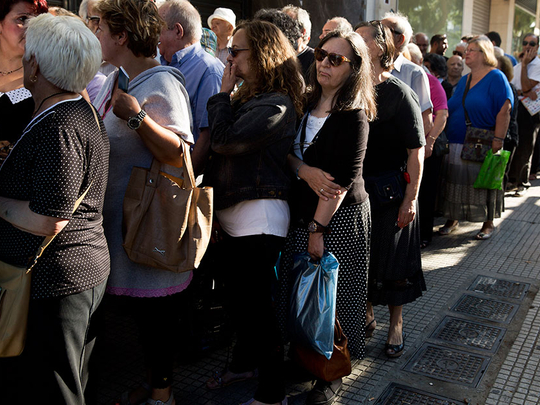
Athens: Greek prime minister Alexis Tsipras will accept most of the bailout creditors' conditions offered last weekend, but is still insisting on a handful of changes that could thwart a deal according to a letter he sent late on Tuesday night.
The two-page letter to the heads of the European Commission, International Monetary Fund (IMF) and European Central Bank (ECB) and obtained by the Financial Times, elaborates on Tuesday's surprise request for an extension of Greece's now-expired bailout and for a new, third rescue rescue worth 29.1 billion euros.
Senior eurozone officials involved in the talks cautioned Mr Tsipras's remaining demands in the letter werre "not a handful of minor changes" and would have "significant fiscal impact" and may not be acceptable to creditors.
German Finance Minister Wolfgang Schaeuble said Wednesday crisis-hit Greece was sending mixed signals in debt talks and called on its government to "clarify its position" before negotiations with creditors can resume.
Schaeuble pointed to conflicting reports on whether Athens still plans a weekend referendum on bailout terms and whether it would support a yes or no vote, noting "all of this is no basis for discussions on serious measures."
"That's why first of all Greece must clarify its position on what it wants, and then we will have to talk about it, under conditions that are now far more difficult," Schaeuble told a Berlin press conference.
Stocks rally
European stock markets rallied on Wednesday, with reports of Greece proposing a fresh deal to its creditors ahead of an EU decision on whether to prolong its bailout programme.
In midday trade, Frankfurt's DAX 30 climbed two percent to 11,166.67 points and the CAC 40 in Paris advanced by 2.39 percent in value to 4,904.90.
Madrid won 1.63 percent and Milan gained 2.41 percent, while the Athens stock markets remained shut.
Outside the eurozone, London's benchmark FTSE 100 index rose 1.39 percent to 6,611.31 points compared with Tuesday's close. In foreign exchange, the euro dipped to $1.1125 from $1.1139 late in New York on Tuesday.
Tsipras' letter was sent as eurozone central bankers were preparing on Wednesday to raise the heat on Greece and its banks by restricting their access to emergency loans, a decision that could topple at least one Greek bank.
Although the bailout's expiry at midnight Tuesday night means the extension is no longer on the table, Mr Tsipras' new letter, which marks a significant climbdown from his previous position, could serve as the basis of a new bailout in the coming days.
Eurozone finance ministers are due to discuss Mr Tsipras' new proposal in a conference call at 5:30pm, Brussels time (4.30pm BST).
Mr Tsipras' letter says Athens will accept all the reforms of his country's value added tax system with one significant change: keeping a special 30 per cent discount for Greek islands, many of which are in remote and difficult-to-supply regions.
Eurozone officails said keeping the exemption would significantly increase the size of the government's budget shortfall and, more significantly, would perpetuate a highly complex VAT system. The complexity is one reason Greece has exceptionally low revenue from VAT.
On the contentious issue of pensions, Mr Tsipras requests that reforms passed in 2012 be implemented more slowly. He also requests that a special "solidarity grant" awarded to poorer pensioners, which he agrees to phase out by December 2019, be phased out more slowly than creditors request.
Eurozone officials said the changes, including making 400 million euro in defence spending cuts in 2017 rather than this year, "could increase the fiscal gap by several hundred million at least".
"The Hellenic Republic is prepared to accept this staff-level agreement subject to the following amendments, additions or clarifications, as part of an extension of the expiring [bailout] program and the new [third] loan agreement for which a request was submitted today, Tuesday June 30th 2015," Mr Tsipras wrote.
"As you will note, our amendments are concrete and they fully respect the robustness and credibility of the design of the overall program."
The European Central Bank's governing council meeting in Frankfurt could increase the amount of collateral required for the emergency loans currently sustaining Greek banks after a last-minute appeal by Athens to extend its bailout was rejected by eurozone finance ministers.
Greece missed a EURO1.5bn payment to the International Monetary Fund that had been set for midnight on Tuesday, becoming the first advanced economy to miss a payment to the fund.
Eurozone finance ministers said ahead of the meeting that they were still open to reaching a debt deal with Athens. "We will take into consideration any offer . . . but any financial support must be provided against commitments to implement those badly-needed reforms that Greece is waiting for," he said.
As the Greek financial system teetered, a poll showed a majority of Greeks would vote No in a snap referendum on Sunday on the terms of a previous bailout deal demanded by foreign lenders, although the lead has narrowed significantly after banks were closed this week.
In a hurriedly-organised conference call on Tuesday, eurozone ministers dismissed the unexpected request from Mr Tsipras rescue for a third bailout. The EURO29.1bn request, sent to the bloc's EURO500bn rescue fund on Tuesday, was the latest twist in Greece's acrimonious stand-off with its international creditors and took many in Brussels by surprise.
Athens' request for a new bailout appeared aimed at swaying the ECB board, since without a programme in place and no negotiations under way the bank may be forced to take a tougher line.
Some European officials dismissed the appeal out of hand while others speculated it was an attempt by Mr Tsipras to strengthen his hand domestically ahead of Sunday's referendum.












